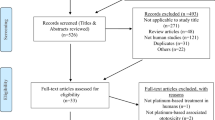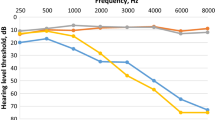Abstract
Purpose
We aimed to investigate the cisplatin-related hearing toxicity and its possible relationship with polymorphic variants in DNA repair genes, ERCC1, ERCC2, and XRCC1.
Methods
Fifty patients treated with cisplatin in the past were included in the study. There were 29 females and 21 males; mean age 13.4 ± 6.0 years). The polymorphism in DNA repair genes was studied using primer and probes in Light Cycler device after DNA isolation was carried out with PCR technique. The polymorphisms and clinical risk factors were evaluated using Chi square test and logistic regression modelling.
Results
The patients had hearing loss in 44%. For ERCC1 gene, the patients with hearing loss had 50% of GG (wild type), 40.9% of AG and 9.1% of AA genotypes, while the patients without hearing loss had 28.6% of GG, 53.5% of AG, and 17.9% of AA genotypes. For ERCC2 gene, the patients with hearing loss had 18.2% of GG (wild type), 40.9% of TG, and 40.9% of TT genotypes, while the patients without hearing loss had 10.7% of GG 39.3% of TG, and 50% of TT genotypes. For XRCC1 gene, the patients with hearing loss had 18.2% of CC (wild type), 59.1% of CT, and 22.7% of TT genotypes, while the patients without hearing loss had 35.7% of CC, 50% of CT, and 14.3% of TT genotypes. There was no statistically significant association among the groups (p = 0.24).
Conclusion
We did not find a relationship between DNA repair gene polymorphisms and hearing toxicity of cisplatin.
Similar content being viewed by others
References
Brock PR, Knight KR, Freyer DR, Campbell KC, Steyger PS, Blakley BW et al (2012) Platinum-induced ototoxicity in children: a consensus review on mechanisms, predisposition, and protection, including a new international society of pediatric oncology boston ototoxicity scale. J Clin Oncol 30(19):2408–2417. https://doi.org/10.1200/JCO.2011.39.1110
Tserga E, Nandwani T, Edvall NK, Bulla J, Patel P, Canlon B et al (2019) The genetic vulnerability to cisplatin ototoxicity: a systematic review. Sci Rep 9(1):3455. https://doi.org/10.1038/s41598-019-40138-z
Peleva E, Emami N, Alzahrani M, Bezdjian A, Gurberg J, Carret AS et al (2014) Incidence of platinum-induced ototoxicity in pediatric patients in Quebec. Pediatr Blood Cancer 61(11):2012–2017
van As JW, van den Berg H, van Dalen EC (2016) Platinum-induced hearing loss after treatment for childhood cancer. Cochrane Database Syst Rev. https://doi.org/10.1002/14651858.CD010181.pub2
Kushner BH, Budnick A, Kramer K, Modak S, Cheung NK (2006) Ototoxicity from high-dose use of platinum compounds in patients with neuroblastoma. Cancer 107:417–422
Landier W, Knight K, Wong FL, Lee J, Thomas O, Kim H et al (2014) Ototoxicity in children with high-risk neuroblastoma: prevalence, risk factors, and concordance of grading scales—a report from the children’s oncology group. J Clin Oncol 32(6):527–534
Yang JJ, Lim JY, Huang J, Bass J, Wu J, Wang C et al (2013) The role of inherited TPMT and COMT genetic variation in cisplatin-induced ototoxicity in children with cancer. Clin Pharmacol Ther 94(2):252–259
Paulino AC, Lobo M, Teh BS, Okcu MF, South M, Butler EB et al (2010) Ototoxicity after intensity-modulated radiation therapy and cisplatin-based chemotherapy in children with medulloblastoma. Int J Radiat Oncol Biol Phys 78(5):1445–1450
Caronia D, Patiño-García A, Milne RL, Zalacain-Díez M, Pita G, Alonso MR et al (2009) Common variations in ERCC2 are associated with response to cisplatin chemotherapy and clinical outcome in osteosarcoma patients. Pharmacogenomics J 9(5):347–353
Rademaker-Lakhai JM, Crul M, Zuur L, Baas P, Beijnen JH, Simis YJ et al (2006) Relationship between cisplatin administration and the development of ototoxicity. J Clin Oncol 24:918–924
Wheeler HE, Gamazon ER, Frisina RD, Perez-Cervantes C, El Charif O, Mapes B et al (2017) Variants in WFS1 and other mendelian deafness genes are associated with cisplatin-associated ototoxicity. Clin Cancer Res 23(13):3325–3333. https://doi.org/10.1158/1078-0432.CCR-16-2809
Brown AL, Lupo PJ, Okcu MF, Lau CC, Rednam S, Scheurer ME (2015) SOD2 genetic variant associated with treatment-related ototoxicity in cisplatin-treated pediatric medulloblastoma. Cancer Med 4(11):1679–1686. https://doi.org/10.1002/cam4.516
Soliman SE, D’Silva CN, Dimaras H, Dzneladze I, Chan H, Gallie BL (2018) Clinical and genetic associations for carboplatin-related ototoxicity in children treated for retinoblastoma: A retrospective noncomparative single-institute experience. Pediatr Blood Cancer 65(5):26931 10.1002/pbc.26931
Choeyprasert W, Sawangpanich R, Lertsukprasert K, Udomsubpayakul U, Songdej D, Unurathapan U et al (2013) Cisplatin-induced ototoxicity in pediatric solid tumors: the role of glutathione S-transferases and megalin genetic polymorphisms. J Pediatr Hematol Oncol 35(4):e138–e143. https://doi.org/10.1097/MPH.0b013e3182707fc5
Brock PR, Bellman SC, Yeomans EC, Pinkerton CR, Pritchard J et al (1991) Cisplatin ototoxicity in children: a practical grading system. Med Pediatr Oncol 19:295–300
Knight KR, Kraemer DF, Neuwelt EA (2005) Ototoxicity in children receiving platinum chemotherapy: underestimating a commonly occurring toxicity that may influence academic and social development. J Clin Oncol 23(34):8588–8596
Chang KW, Chinosomvatana N (2010) Practical grading system for evaluating cisplatin ototoxicity in children. J Clin Oncol 28:1788–1795
Qaddoumi I, Bass JK, Wu J, Billups CA, Wozniak AW, Merchant TE et al (2012) Carboplatin-associated ototoxicity in children with retinoblastoma. J Clin Oncol 30(10):1034–1041
Ross CJ, Katzov-Eckert H, Dubé MP, Brooks B, Rassekh SR, Barhdadi A et al (2009) Genetic variants in TPMT and COMT are associated with hearing loss in children receiving cisplatin chemotherapy. Nat Genet 41(12):1345–1349. https://doi.org/10.1038/ng.478
Hagleitner MM, Coenen MJ, Patino-Garcia A, de Bont ES, Gonzalez-Neira A, Vos HI et al (2014) Influence of genetic variants in TPMT and COMT associated with cisplatin induced hearing loss in patients with cancer: two new cohorts and a meta-analysis reveal significant heterogeneity between cohorts. PLoS One 9(12):e115869. https://doi.org/10.1371/journal.pone.0115869
Mironovich OL, Bliznetz EA, Garbaruk ES, Belogurova MB, Subora NV, Varfolomeeva SR et al (2018) The analysis of the association of the polymorphic variants of the TPMT, COMT, and ABCC3 genes with the development of hearing disorders induced by the cisplatin treatment. Vestn Otorinolaringol 83(4):60–66. https://doi.org/10.17116/otorino201883460
Thiesen S, Yin P, Jorgensen AL, Zhang JE, Manzo V, McEvoy L et al (2017) TPMT, COMT and ACYP2 genetic variants in paediatric cancer patients with cisplatin-induced ototoxicity. Pharmacogenet Genomics 27(6):213–222
Zhou W, Gurubhagavatula S, Liu G, Park S, Neuberg DS, Wain JC et al (2004) Excision repair cross-complementation group 1 polymorphism predicts overall survival in advanced non-small cell lung cancer patients treated with platinum-based chemotherapy. Clin Cancer Res 10:4939–4943
Suk R, Gurubhagavatula S, Park S, Zhou W, Su L, Lynch TJ et al (2005) Polymorphisms in ERCC1 and grade 3 or 4 toxicity in non-small cell lung cancer patients. Clin Cancer Res 15:1534–1538
Obiedat H, Alrabadi N, Sultan E, Al Shatti M, Zihlif M (2018) The effect of ERCC1 and ERCC2 gene polymorphysims on response to cisplatin based therapy in osteosarcoma patients. BMC Med Genet 19(1):112
Wang Z, Xu B, Lin D, Tan W, Leaw S, Hong X et al (2008) XRCC1 polymorphisms and severe toxicity in lung cancer patients treated with cisplatin-based chemotherapy in Chinese population. Lung Cancer 62:99–104. https://doi.org/10.1016/j.lungcan.2008.02.019
Author information
Authors and Affiliations
Corresponding author
Ethics declarations
Conflict of interest
The author(s) declare that they have no competing interests.
Additional information
Publisher's Note
Springer Nature remains neutral with regard to jurisdictional claims in published maps and institutional affiliations.
Rights and permissions
About this article
Cite this article
Turan, C., Kantar, M., Aktan, Ç. et al. Cisplatin ototoxicity in children: risk factors and its relationship with polymorphisms of DNA repair genes ERCC1, ERCC2, and XRCC1. Cancer Chemother Pharmacol 84, 1333–1338 (2019). https://doi.org/10.1007/s00280-019-03968-2
Received:
Accepted:
Published:
Issue Date:
DOI: https://doi.org/10.1007/s00280-019-03968-2




